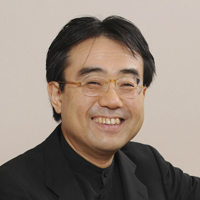Title of Presentation
“The Forest of 20th Century Music: Travelling through It with the Piano(covering music of Kyoto Prize winning composers)”
This 30-minute thrilling lecture takes the form of a mini recital with MC that invites the audience to “a travel through the forest (or ocean) of 20th century music” where some of the former Kyoto Prize winning composers will serve as the “guideposts.”
Composers to be covered in the recital are:
・John Cage (the 5th Kyoto Prize winner)
Solo, the solo version of Concert for Piano and Orchestra, and one piece
from Music for Piano, a series of 84 compositions.
・Olivier Messiaen (the 1st Kyoto Prize winner)
One piece from Catalogue d’oiseaux or from Préludes
・Jo Kondo
Either Ritornello or Metaphonesis
・Toshio Nakagawa
The world premiere of a new work
(the one possibly including almost all the elements of 20th century music)
As indicated above, the program has only been given a rough outline and is subject to change depending on my or others’ ideas, which is in line with Cage’s concept of aleatoric music (it can suddenly change even on the day of the performance). In this recital, I would like to show my perspectives on the 20th and 21st century music as a “composer” through my performance as a “pianist.”
The composers who have been so far awarded the Kyoto Prize lived during the so-called golden era of 20th century avant-garde music (mainly in the 1950s and 60s). However, today in the 21st century, the concept of avant-garde is no longer self-evident. Does it sound exaggerating if I say that avant-garde music has become the past in itself? I define this mini recital as an opportunity for us to think about “the present moment” of music while at the same time looking back on the avant-garde music of the previous century in the abovementioned context by taking a historical distance perhaps with some sense of irony.
While I am preparing for this symposium, some unanswerable questions are crossing my mind: “If I compose a melody which everyone can enjoy in a normal way, is it no longer avant-garde?”; “Do such melodies exist that are abnormal but at the same time people can enjoy ordinarily?”; “Shouldn’t a composer express truly “necessary” sounds even if he dislikes them instead of composing only with sounds he is fond of? Aren’t the favorite sounds of a person simply those chosen by him within limited possibilities based on his value judgment attributable to the narrow range of his past experience?
Profile
- A brief Biography
-
Toshio Nakagawa is a composer / pianist who was born in Tokyo in 1958. He is a graduate of the Composition Department at Toho Gakuen College. He studied composition under Akira Miyoshi, and the piano under Katsuyo Suemitsu and Yoko Moriyasu. He won the first prize at the International Composition Competition which was held as part of Music Today ’82 (a festival planned and designed by Toru Takemitsu) to celebrate the 10th anniversary of the festival. His work was highly acclaimed by John Cage, who was 70 years old at the time and invited to the event as a guest. In 1988, he won the Muramatsu Prize. In 2009, Nakagawa was featured in ‘A Profile of a Composer 2009’, a concert held by the Suntory Foundation for Arts showcasing his orchestral works. This concert later resulted in his winning the 28th Kenzo Nakajima Music Award. He has been also awarded with multiple ACC Awards by the TV commercial music industry.
Nakagawa has collaborated with various artists including singer Youmi Kimura, Japanese festival music performer Toru Fukuhara, and choreographer Hiroshi Koike who is also the director of Pappa TARUHUMARA dance company. His activities with Futagoza Sanjusodan (Gemini Trio), which he formed with trumpet player Kiyonori Sokabe and baritonist Takashi Matsudaira in 2005, have gained much attention in recent years.
Nakagawa released CDs with Toshiba EMI including chai, which contains his TV commercial music series of Suntory’s Oolong Tea, and cocoloni utao. He has also appeared frequently on TV shows including TV Asahi’s Daimei no nai ongakukai (Untitled Concert).
Currently, Nakagawa serves as the vice-president of the Japan Society for Contemporary Music, the executive director of the Japan Federation of Composers Inc., the deputy representative of Shinshinkai (a group of composers), a lecturer at Ochanomizu University, and a composition instructor at El Sistema Japan. - Details of selected Awards and Honors
-
・The first prize at Music Today’s 10th Anniversary International Composition Competition (1982)
・The Muramatsu Prize (1988)
・The 12th Kenzo Nakajima Music Award, as a member of performance and creative group Art Respirant (1988)
・The 28th Kenzo Nakajima Music Award, as an individual composer (2010)
- A list of selected Publications
-
・Music for Three Noise-makers (1989)
・Luminescence / Reminiscence for Soh (Koto) and prepared Soh by solo player (1997)
・Concert Grosso No. 2 for large Orchestra (1988)
・Concert Grosso No. 3 for large Orchestra (2009)
・Curvature for Orchestra (2009)
・Der Doppelgänger: in homage of the song with the same title by
F. Schubert, etc. (2009)・Pater Noster for Baritone solo and Piano (2007)
・Three Duologues, Seven Monologues, and 31 Fragments for Baritone and Tuba (2012)






